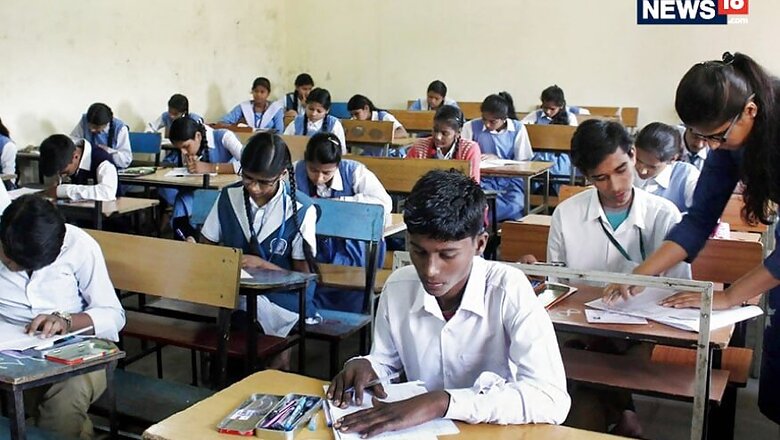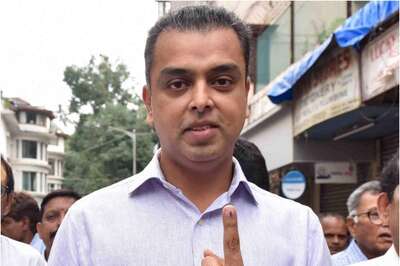
views
New Delhi: Following a backlash from leaders of Tamil Nadu over the inclusion of Hindi language in schools under the draft New Education Policy (NEP), the Ministry of Human Resource Development on Sunday tweaked the contentious parts of the draft that have been put up for public opinion.
Government sources told News18, “Imposing Hindi was never the intention. The way the draft was being perceived was contrary to the spirit of the three-language formula. That’s why tweaks have been made. This is not a U-turn.”
Titled 'flexibility in the three-language formula', the section on its implementation now reads, "In keeping with the principle of flexibility, students who wish to change one or more of the three languages they are studying may do so in grade 6 or 7, so long as they are able to still demonstrate proficiency in three languages (on language at the literature level) in their modular board examination some time during secondary school.
"Since the modular examination for language proficiency will indeed test only for basic proficiency in each language such a change in language choice in grade 6 would certainly be feasible if this student so desires and would in such cases be supported by teachers and schooling system. Additional choices of languages would therefore be offered in middle school for this purse of choice and flexibility."
“The change in language choice by students in the middle school will be subject to the condition that they would still require to demonstrate the expected level of proficiency in three languages (one language at the literature level) in their modular board examinations some time during secondary school.
"Since the modular board examinations for language proficiency will indeed test only for basic proficiency in each language, and since it is possible to achieve basic proficiency in a language in a span of about four years, such a change in language choice in Grade 6 would certainly be feasible if the student so desires and would in such cases be supported by teachers and the schooling system. Additional choices of languages would therefore be offered in middle school for facilitating flexibility in the study of languages within the three language formula.”
Earlier the draft that sparked a row over imposition of Hindi said, “In keeping with the principle of flexibility, students who wish to change one of the three languages they are studying may do so in Grade 6, so long as the study of three languages by students in the Hindi-speaking states would continue to include Hindi and English and one of the modern Indian languages from other parts of India, while the study of languages by students in the non-Hindi-speaking states would include the regional language, Hindi and English.”
The draft, proposed by a panel constituted by Prakash Javadekar when he was the HRD minister in the previous government and led by eminent scientist K Kasturirangan, had suggested teaching of Hindi in non-Hindi speaking states.
Political parties in Tamil Nadu, including the DMK, strongly opposed the three-language formula’s continuation and said it was tantamount to "thrusting" Hindi on the state's people.
While DMK chief MK Stalin dubbed the move as ‘throwing stones at a beehive’, party leader T Siva said the Centre was playing with fire with such a decision.
Former minister and Congress MP Shashi Tharoor on Sunday entered the debate, saying the solution to the three-language formula is not by abandoning the idea but ensuring its better implementation across the country.
"Most of us in the south learn Hindi as a second language, but nobody in the north is learning Malayalam or Tamil," said Tharoor.
"The solution is not to abandon the three-languages formula but to implement it in a better manner."
The latest to join the debate is Congress leader Siddaramaiah who said on Monday the Centre was imposing Hindi on non-Hindi speaking states and sought for “more space”.
Using the hashtag StopHindiImposition, the former Karnataka chief minister wrote on Twitter, “Ours is a land that exhibits Unity in Diversity. Peaceful coexistence is the need to establish harmony &any force shall work against the laws of society. For us Kannada is an identity, &learning any other language should be by Choice & not by imposition.
Instead of imposing Hindi, the government should focus on recognising regional identities & give more space to the states to express & manifest their ideas through their own culture & language.We are all Kannadigas in India.#StopHindiImposition3/3— Siddaramaiah (@siddaramaiah) June 3, 2019
Besides, the Communist Party of India and the BJP’s ally in the Lok Sabha election, the PMK, also alleged that the recommendation on the three-language formula was "imposition of Hindi" and demanded that the proposal be done away with.
AMMK leader TTV Dhinakaran said, "Imposing Hindi on non-Hindi speaking states will destroy pluralism. This would make non-Hindi speakers second-class citizens."
Issuing a clarification, the ministry said, “This is a draft policy submitted by the committee and is placed for the views of the general public.”
Javadekar said misinformation was being created about the issue and the government had no intention of spreading a particular language. “We are considering public consensus,” he added.
Union HRD Minister Ramesh Pokhriyal also described it as a misunderstanding. “State governments must have got the wrong information. Besides, Prime Minister Narendra Modi has already said that no particular language will be imposed on any region. We have made a draft and we will be collecting information from various states and then we will have further discussions," he said.
















Comments
0 comment